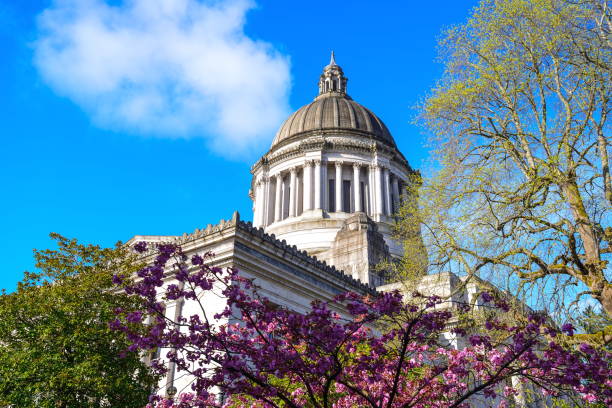The expectations were that the Senate majority’s budget would be more fiscally conservative than the House version (set to be released later today). Let’s hope that belief was wrong. The Senate majority proposes a massive 12% increase in spending that takes state appropriations to $59.2 billion (Funds Subject to Outlook) while draining total reserves to less than $1.1 billion (under 2% of spending). Total budgeted operating spending for 2021-23 under the proposal is projected to increase to $119.4 billion.
The Senate budget assumes passage of an income tax on capital gains (SB 5096), as well as economically troublesome proposals for Cap and Trade (SB 5126) and a Low Carbon Fuel Standard (HB 1091). The balance sheet does appear to have an $800 million cushion though until June 30, 2023 (last day of biennium). It isn’t until that day than an $800 million appropriation would be made to pay down the unfunded liability in the Teachers Retirement System (TRS 1).
By waiting to make this pension payment until June 30, 2023, the Senate gains time to see if this spending will be allowed under the new federal COVID stimulus package and how the balance sheet looks at that time. Buried on page 579 of the new federal COVID stimulus law is this restriction: “No State or territory may use funds made available under this section for deposit into any pension fund.”
Along with the $800 million pension payment, there were several other interesting budget provisos in the proposed 946-page Senate budget bill:
- Assuming passage of the income tax on capital gains, $6.7 million is provided to Department of Revenue (DOR) to implement the new income tax and $122,000 is provided to the Attorney General for legal costs relating to the tax.
- Sec. 302 (28) assumes passage of the Low Carbon Fuel Standard bill and makes related appropriations.
- There are several budget sections that assumes passage of the Cap and Trade bill and makes appropriations for the implementation.
- Sec. 965 creates reporting requirements for the Governor if spending unanticipated federal funds exceeding $5 million. This is in response to the Governor not calling a special session last year when spending billions in federal COVID funds.
- Sec. 137 (2) provides just over $2 million to DOR "to enable the tax structure work group to complete its duties and activities during the 2021-2023 fiscal biennium."
- Sec. 607 (15) provides $85k "to gauge the prospects for a collaborative approach to integration of leadership, aligning roles and responsibilities, and increasing efficiency and responsiveness of the state's K-12 education governance structure."
- Sec. 205 (9) is a $77k study on "feasibility of implementing a universal basic income pilot program."
- Sec. 607 (8) has $500k "for Washington State University's energy program to launch a least-conflict priority solar siting pilot project in the Columbia basin of eastern and central Washington."
- Sec. 309 (2) has $576k "for the Puget Sound partnership to develop and implement an action plan that advances diversity, equity, and inclusion and environmental justice in Puget Sound recovery efforts."
- Sec. 308 (10) provides $940k "to survey the diets of seals and sea lions in Puget Sound and identify non-lethal management actions to deter them from preying on salmon and steelhead."
- Sec. 308 (5) says Fish and Wildlife "must provide focus on minimizing wolf-livestock issues in the Kettle range. The department may not use firearms from helicopters for removing wolves."
- Sec. 129 (41) shows earmarks are alive and well in the state budget. How many entities across this state are eligible to apply for this $1 million Commerce childcare contract? "The nonprofit organization must be a Bellingham, Washington-based nonprofit community action agency with fifty years of experience..."
- Sec. 119 provides the Lt. Governor $300k "to conduct a business competitiveness analysis of the state’s economy.”
The Senate proposes a 12% increase in spending (not counting the federal COVID funds) while draining reserves to less than 2%. The budget assumes adoption of a constitutionally suspect income tax on capital gains and the expensive environmental Cap and Trade and Low Carbon Fuel Standard bills. By increasing spending this high and leaving such low reserves, while at the same time enacting these economically controversial tax and climate policies, the Senate is making a big bet that employers and individuals can absorb the shock of these proposals without harming the state’s economic recovery and competitiveness.






